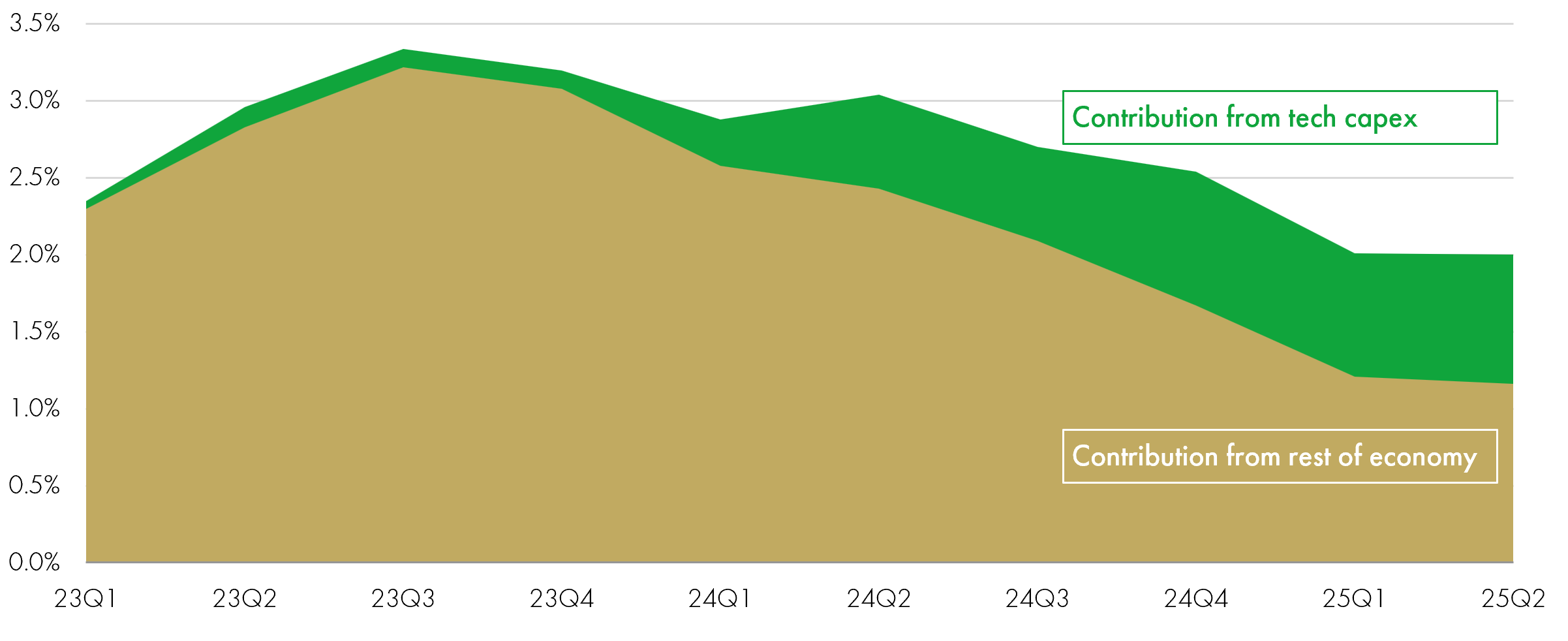This article is featured in the Q3 2025 Future Strategist newsletter, you can read the rest of the newsletter here.
The outlook for the rest of 2025 continues to present plenty of opportunities for differentiated and diversified returns in equity markets. As we outlined in the review section for the first nine months of 2025, the path to the best returns will likely continue to lie outside the concentrated M7 trade; they now account for 40% of the S&P market capitalisation and this has proved troublesome for active managers bent on finding better alternatives. The evidence of the first nine months of 2025 suggests this is becoming easier.
At the same time, risks are building around the world both in terms of the geopolitical and the economic. Much of the US data remain weak yet headline GDP numbers print at robust levels. The chart from Bridgewater shows one reason for this – the level of capex investment in AI is having a meaningful impact on headline GDP numbers although this has little impact on the low-end consumer.
US real GDP growth contribution from tech capex (%)

Source: Bridgewater, August 2025. Past performance does not predict future returns.
This backdrop adds to the need to work carefully on the risk/reward balance of many trades that have worked well for so many years. While, thematically, we remain positive on the potential for AI and for short-term infrastructure investments, we are concerned that we are in the throws of a bubble. The recent trend of vendor financing highlights this risk and, while in the early stages, acts as a warning sign. Trying to predict the impact of this factor and what the outcome will be is tough but experience is a vital asset; it is surely more valuable to have lived through the boom/bust dynamics of a bubble than merely to have read about them. According to Morningstar analytics, only 4% of the 1,700 US large cap equity managers actually managed money through the dotcom era.
The performance outside the US capex trade has been strong, as shown in the table in the first section of the newsletter, so we believe there are plenty of opportunities to invest across multiple themes, geographies and sectors to mitigate against individual risks.
Our base case is that equity markets globally will remain little changed in the final quarter of the year but there will be plenty of ways to enhance returns beyond the index level. These include the fact that defence spending remains a key theme in Europe, the catch-up trade in Chinese tech/AI versus the US, Japanese digitalisation and emerging markets equities on the back of a weaker US dollar, which provide the geographical diversification for concentrated US portfolios.
Within the US, we take the view the winners of the next 10 years will not be the same as the last 10 and so companies that use AI effectively across multiple sectors offer interesting opportunities. Within technology, we remain cautious on the longevity of the AI capex cycle and favour selective names that support the trends in AI rather than the titans that build it.
The path of the US dollar is a critical component of many investment themes today and we expect the currency to remain weak on the back of government debt levels and the debt servicing bill that is now close to the 4% of GDP level seen by many as an exit velocity level. Assuming this to be the case, any equity investments must be viewed through the lens of a weak dollar, and this is perhaps the biggest factor in deciding geographical exposures as well as other adjacent ideas like the continued success of investing in stores of value like gold, gold miners and crypto.
KEY RISKS
Past performance does not predict future returns. You may get back less than you originally invested.
We recommend this fund is held long term (minimum period of 5 years). We recommend that you hold this fund as part of a diversified portfolio of investments.
The Funds managed by the Global Equities Team:
- May hold overseas investments that may carry a higher currency risk. They are valued by reference to their local currency which may move up or down when compared to the currency of a Fund.
- May encounter liquidity constraints from time to time. The spread between the price you buy and sell shares will reflect the less liquid nature of the underlying holdings.
- May invest in smaller companies and may invest a small proportion (less than 10%) of the Fund in unlisted securities. There may be liquidity constraints in these securities from time to time, i.e. in certain circumstances, the fund may not be able to sell a position for full value or at all in the short term. This may affect performance and could cause the fund to defer or suspend redemptions of its shares.
- May have a concentrated portfolio, i.e. hold a limited number of investments or have significant sector or factor exposures. If one of these investments or sectors / factors fall in value this can have a greater impact on the Fund's value than if it held a larger number of investments across a more diversified portfolio.
- May invest in emerging markets which carries a higher risk than investment in more developed countries. This may result in higher volatility and larger drops in the value of a fund over the short term.
Certain countries have a higher risk of the imposition of financial and economic sanctions on them which may have a significant economic impact on any company operating, or based, in these countries and their ability to trade as normal. Any such sanctions may cause the value of the investments in the fund to fall significantly and may result in liquidity issues which could prevent the fund from meeting redemptions. - May invest in companies predominantly in a single country which maybe subject to greater political, social and economic risks which could result in greater volatility than investments in more broadly diversified funds.
- May hold Bonds. Bonds are affected by changes in interest rates and their value and the income they generate can rise or fall as a result; The creditworthiness of a bond issuer may also affect that bond's value. Bonds that produce a higher level of income usually also carry greater risk as such bond issuers may have difficulty in paying their debts. The value of a bond would be significantly affected if the issuer either refused to pay or was unable to pay.
- May, in certain circumstances, invest in derivatives but it is not intended that their use will materially affect volatility. Derivatives are used to protect against currencies, credit and interest rate moves or for investment purposes. The use of derivatives may create leverage or gearing resulting in potentially greater volatility or fluctuations in the net asset value of the Fund. A relatively small movement in the value of a derivative's underlying investment may have a larger impact, positive or negative, on the value of a fund than if the underlying investment was held instead.
The risks detailed above are reflective of the full range of Funds managed by the Global Equities Team and not all of the risks listed are applicable to each individual Fund. For the risks associated with an individual Fund, please refer to its Key Investor Information Document (KIID)/PRIIP KID."
The issue of units/shares in Liontrust Funds may be subject to an initial charge, which will have an impact on the realisable value of the investment, particularly in the short term. Investments should always be considered as long term.
DISCLAIMER
This material is issued by Liontrust Investment Partners LLP (2 Savoy Court, London WC2R 0EZ), authorised and regulated in the UK by the Financial Conduct Authority (FRN 518552) to undertake regulated investment business.
It should not be construed as advice for investment in any product or security mentioned, an offer to buy or sell units/shares of Funds mentioned, or a solicitation to purchase securities in any company or investment product. Examples of stocks are provided for general information only to demonstrate our investment philosophy. The investment being promoted is for units in a fund, not directly in the underlying assets.
This information and analysis is believed to be accurate at the time of publication, but is subject to change without notice. Whilst care has been taken in compiling the content, no representation or warranty is given, whether express or implied, by Liontrust as to its accuracy or completeness, including for external sources (which may have been used) which have not been verified.
This is a marketing communication. Before making an investment, you should read the relevant Prospectus and the Key Investor Information Document (KIID) and/or PRIIP/KID, which provide full product details including investment charges and risks. These documents can be obtained, free of charge, from www.liontrust.com or direct from Liontrust. If you are not a professional investor please consult a regulated financial adviser regarding the suitability of such an investment for you and your personal circumstances.

Mark Hawtin
Mark Hawtin is head of the Global Equities team. Mark joined Liontrust in 2024 from GAM, where he was an Investment Director running global long-only and long/short funds investing in the disruptive growth & technology sectors. Before joining GAM in 2008 he was a partner and portfolio manager with Marshall Wace Asset Management for eight years, managing one of Europe’s largest technology, media and telecoms hedge funds.

